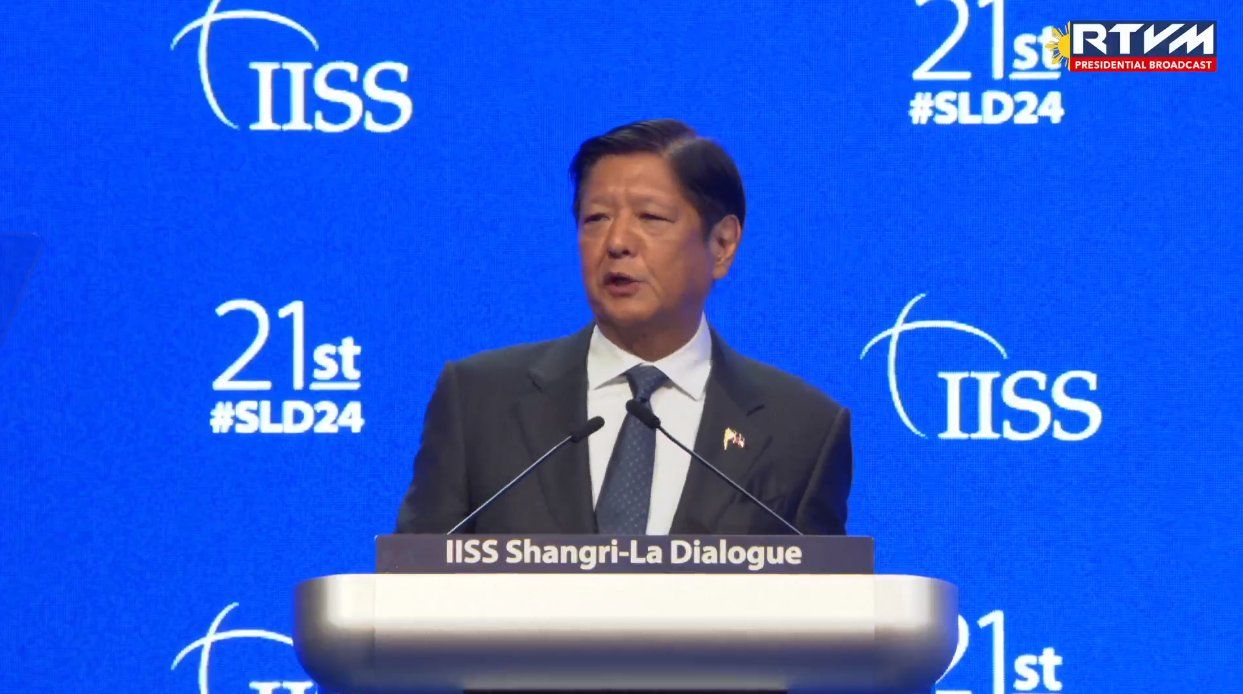Marcos: PH claim on West Philippine Sea based on international law, not imagination
At A Glance
- According to Marcos, the Philippines' claim on the disputed waters is backed by the 1982 United Nations Convention on the Law of the Sea (UNCLOS), which clarifies the limits of each state's maritime zone, the 2016 Arbitral Award, and not mere imagination.
President Marcos stressed the Philippines' claim on the disputed portions of the South China Sea, saying the lines that the country draws on its waters are not derived from imagination but from international law.

Marcos said this as China ordered its Coast Guard to detain foreigners "trespassing" into the South China Sea for up to 30 days if they violate China’s exit-entry rules.
In his keynote address for the 21st edition of the International Institute for Strategic Studies (IISS) Shangri-La Dialogue on Friday evening, May 31, the President said he would not surrender an inch of the country's territory to foreign powers.
"The life-giving waters of the West Philippine Sea flow in the blood of every Filipino. We cannot allow anyone to detach it from the totality of the maritime domain that renders our nation whole," he said.
"As President, I have sworn to this solemn commitment from the very first day that I took office. I do not intend to yield. Filipinos do not yield," he added.
According to Marcos, the Philippines' claim on the disputed waters is backed by the 1982 United Nations Convention on the Law of the Sea (UNCLOS), which clarifies the limits of each state's maritime zone, the 2016 Arbitral Award, and not mere imagination.
"We have defined our territory and maritime zones in a manner befitting a responsible and law-abiding member of the international community," he said.
"Our efforts stand in stark contrast to assertive actions that aim to propagate excessive and baseless claims through force, intimidation, and deception," he added.
The President said this gives the Philippines the strength to fight for its "sovereign home."
"We have submitted our assertions to rigorous, legal scrutiny by the world's leading jurors. So the lines that we draw in our waters are not derived from just our imagination, but from international law," he said.
"In this solid footing and through our clear moral ascendancy, we find the strength to do whatever it takes to protect our sovereign home — to the last square inch, to the last square millimeter," he added.
As a country that values amity, fraternity, and the rule of law, President Marcos said the Philippines has always defined its territory with international treaties. This includes the Treaty of Paris which crystallized its islands as a cohesive whole and the Treaty of Washington which clarified the extent of its sovereignty and patrimony.
"We sought to uphold and preserve the integrity of our country's physical unity to international law," he said.
"Accordingly, we have made a conscious effort to align our definition of our territory and our maritime zones with what international law permits and recognizes. This has been inscribed in Article I of our Constitution," he added.
Marcos, who co-sponsored the Archipelagic Baselines Law that defines the bases of the Philippines' maritime jurisdictions, said he was looking forward to signing the Maritime Zones Law which will clarify the geographic extent of the country's maritime domain.